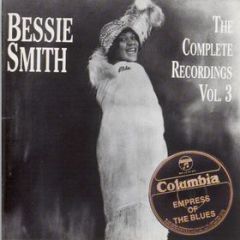Bessie Smith – The Complete Recordings Vol.3 (1925-1928) 1992
Bessie Smith – The Complete Recordings Vol.3 (1925-1928) 1992

CD I:
1) Red Mountain Blues;
2) Golden Rule Blues;
3) Lonesome Desert Blues;
4) Them Has Been Blues;
5) Squeeze Me;
6) What's The Matter Now;
7) I Want Every Bit Of It;
8) Jazzbo Brown From Memphis Town;
9) The Gin House Blues;
10) Money Blues;
11) Baby Doll;
12) Hard Driving Papa;
13) Lost Your Head Blues;
14) Hard Time Blues;
15) Honey Man Blues;
16) One And Two Blues;
17) Young Woman's Blues;
18) Preachin' The Blues; play
19) Backwater Blues;
20) After You've Gone;
21) Alexander's Ragtime Band.
CD II:
1) Muddy Water (A Mississippi Moan); play
2) There'll Be A Hot Time In The Old Town Tonight;
3) Trombone Cholly;
4) Send Me To The 'Lectric Chair;
5) Them's Graveyard Words;
6) Hot Spring Blues;
7) Sweet Mistreater;
8) Lock And Key;
9) Mean Old Bed Bug Blues;
10) Homeless Blues;
11) Looking For My Man Blues;
12) Dyin' By The Hour;
13) Foolish Man Blues;
14) Thinking Blues;
15) Pickpocket Blues;
16) I Used To Be Your Sweet Mama;
17) I'd Rather Be Dead And Buried In My Grave;
18) I'd Rather Be Dead And Buried In My Grave (alt. take).
Listening to this collection, recorded from 1925 to 1928 as Bessie Smith's popularity grew, one only wishes that the recording technology of the day were a match for Smith's incredible voice. Naturally, this two-disc set contains many of her classic recordings, including "Back Water Blues," "Send Me to the 'Lectric Chair," "Lock and Key," "A Good Man Is Hard to Find," and "After You've Gone." This collection's also worth hearing for the backing musicians, who include Fletcher Henderson, James P. Johnson, Coleman Hawkins, and other luminaries of the day. To listen to Bessie Smith is to hear the blues unadulterated, and to understand what inspired so many contemporaries and later singers, from Billie Holiday to Janis Joplin. --Genevieve Williams
Bessie Smith, "Empress of the Blues," is largely known today because alcoholic blues-screamer Janis Joplin based her style on her. As a result, Bessie went from the province of the specialty collector to being a mainstream "blues" artist with almost as many imitators as the Beatles. (Elvis is a whole different galaxy.) In the year 2003, then, Bessie Smith - not Enrico Caruso - is the most-listened-to early recording artist. In a way this is good, since we went from a recreative artist to a very creative one; but this has also skewed our perspective on the blues-singing era.
Bessie had a huge, bronze voice of enormous expressivity and power. On some of these records, just listening to her delivery will send goosebumps down your spine. But truthfully, she only had one good octave in the voice, a deficiency she hid quite well by pitching her songs a certain way and then "playing around" with the notes so she didn't have to go too low (or, in some cases, too high). This is why other artists during this era were more highly prized by others. Bix Beiderbecke once threw $50 at his idol, Ethel Waters; Connee Boswell based her style on Mamie Smith (no relation); Alan Ginsburg preferred Bessie's mentor, Ma Rainey; and other singers and musicians like Ida Cox, Clara Smith and Victoria Spivey better. Bessie was a huge star and could hypnotize an audience, but she was NOT as universally admired as we now believe.
This compilation covers her best years, 1926-28, and has the highest percentage of excellent recordings. The sad thing is that no one- or two-disc compilation covers her best recordings. One can usually spot the "great" Bessie Smith records not just by how well her voice recorded but also by the fire and commitment of her delivery, and sometimes that happened in pop or show songs like "Squeeze Me," "Alexander's Ragtime Band," "Jazzbo Brown from Memphis Town" (written by the Gershwin brothers and DuBose Heyward, NOT by "G. Brooks" as listed on the CD label!) or "At the Christmas Ball." Too many Bessie recordings (like too many female blues recordings in general) fall into the "my-man-done-beat-me-and-treat-me-like-dirt-but-I-love-him-anyway" category.
The shame of it is, Bessie's best recordings can be boiled down to three CDs, but no one has done this so far. Columbia's repackaging is both wasteful and expensive, allowing only 18 or 19 tracks per CD when they could have allowed 24 and done the whole project in 7 CDs instead of 10. The booklets are lavish, however, and include rare photos of some of Bessie's best accompanists, including the great cornetist Joe Smith and the elusive pianist Fred Longshaw. ---madamemusico
download: uploaded anonfiles mega 4shared mixturecloud yandex mediafire ziddu
Last Updated (Tuesday, 03 September 2013 22:43)








